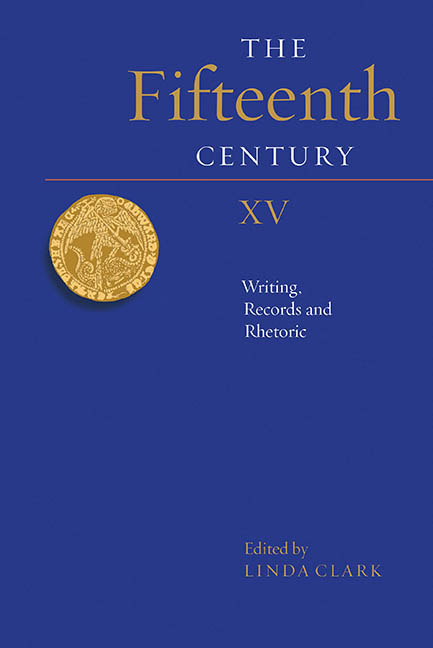Book contents
- Frontmatter
- Contents
- List of Illustrations
- Contributors
- Preface
- Abbreviations
- The Libelle of English Policy: The Matter of Ireland
- ‘Stories of Divers Regions and Provinces’: Some Digests of History and Geography for Late-Medieval English Readers
- ‘To please … Dame Cecely that in latyn hath litell intellect’: Books and the Duchess of York
- A Case Study in Lancastrian Service and Personal Survival: The Career of William, Lord Roos of Helmsley (c.1370–1414)
- Identity, Discourse and Political Strategy: Margrave Albrecht Achilles (1414–86) and the Rhetoric of Antagonism between Town and Nobility in Upper Germany
- The Redistribution of Forest Law and Administration in Fifteenth-Century England
- Well-Connected and Qualified Clerics? The Bishops of Dunkeld and Sodor in the Fifteenth Century
- Preaching Politics: Lancastrian Chancellors in Parliament
- Bishop John Alcock and the Roman Invasion of Parliament: Introducing Renaissance Civic Humanism to Tudor Parliamentary Proceedings
- Preaching on Magna Carta at the end of the fifteenth century: john alcock's sermon at paul's cross
- Index
- CONTENTS OF PREVIOUS VOLUMES
‘Stories of Divers Regions and Provinces’: Some Digests of History and Geography for Late-Medieval English Readers
Published online by Cambridge University Press: 23 August 2019
- Frontmatter
- Contents
- List of Illustrations
- Contributors
- Preface
- Abbreviations
- The Libelle of English Policy: The Matter of Ireland
- ‘Stories of Divers Regions and Provinces’: Some Digests of History and Geography for Late-Medieval English Readers
- ‘To please … Dame Cecely that in latyn hath litell intellect’: Books and the Duchess of York
- A Case Study in Lancastrian Service and Personal Survival: The Career of William, Lord Roos of Helmsley (c.1370–1414)
- Identity, Discourse and Political Strategy: Margrave Albrecht Achilles (1414–86) and the Rhetoric of Antagonism between Town and Nobility in Upper Germany
- The Redistribution of Forest Law and Administration in Fifteenth-Century England
- Well-Connected and Qualified Clerics? The Bishops of Dunkeld and Sodor in the Fifteenth Century
- Preaching Politics: Lancastrian Chancellors in Parliament
- Bishop John Alcock and the Roman Invasion of Parliament: Introducing Renaissance Civic Humanism to Tudor Parliamentary Proceedings
- Preaching on Magna Carta at the end of the fifteenth century: john alcock's sermon at paul's cross
- Index
- CONTENTS OF PREVIOUS VOLUMES
Summary
Embarking on the compilation of a universal history, the Polychronicon, sometime shortly after 1327, Ranulph Higden opened the work with some consideration of the reasons for reading about history: ‘In historico namque contextu chronographorum nobis diligentia delegato relucet clarius norma morum’ (in John Trevisa's later fourteenth- century English translation, ‘in þe makynge and bookes of stories, þat is to vs i-sent and byqueþe by grete besynesse of þe writers of cronicles, blaseþ and schyneþ clerliche þe ri3t rule of þewes’). In other words, through reading accounts of past history we can learn how to live properly (‘þe ri3t rule of þewes’). Some paragraphs further on Higden returned to the desirability of cultivating learning that would equip people to understand history:
Satagentibus igitur plenam historiae notitiam apprehendere utile foret octo scire, vidilicet descriptiones locorum, status rerum, distinctiones temporum, successiones regiminum, variationes rituum, decursiones aetatum, qualitates actionum; et in his omnibus varias prorsus supputationes annorum (To hem þat will haue ful knowleche of stories nedeþ eyþte þinges [to knowe: descrypcions of places, states of thynges], distinccion of tymes, aftir followynge of kyngdoms, dyuerste of liuynge, passynge of ages, maner of doynge, and in all þese verray acountynge of 3eres.)
To fully comprehend what you read, he suggests, you need not just a properly informed understanding of history, but to know something about places and cultural difference (‘dyuerste [sic] of liuynge’) too. For these reasons Higden began the Polychronicon with a description of the known world, which takes up the first book, calling this section of the work a ‘mappa mundi’, a term sometimes used by later readers of the whole of the Polychronicon. While Higden advanced ethically aspirational reasons for learning about the world, other late medieval authorities drew attention to the more practical advantages such knowledge might confer. A very short English account of world geography, surviving in its earliest form in a printed edition from c.1502, was to be recommended to sixteenth-century readers as ‘Uery necessary for all Marchauntes and Maryners And for all such as wyll labour & traueyle in the countres of the worlde’: knowledge of the world around you helps you to get your work done and make some money.
- Type
- Chapter
- Information
- The Fifteenth Century XV , pp. 23 - 36Publisher: Boydell & BrewerPrint publication year: 2017

